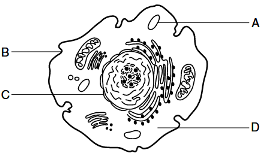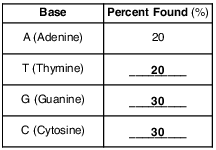Topic: Inherited Traits And Genetic Codes
Inherited Traits And Genetic Codes
Compared to a normal body cell, a normal egg cell contains
(1) the same number of chromosomes
(2) half the number of chromosomes
(3) twice the number of chromosomes
(4) four times the number of chromosomes
The diagram below represents a microscopic structure observed during mitosis.

The region indicated by letter A is known as
(1) an enzyme
(2) a gamete
(3) a gene
(4) an amino acid
The diagram below represents a cell.

Which letter indicates the specific structure where most hereditary mutations occur?
(1) A
(2) B
(3) C
(4) D
Traits are passed from parents to offspring. These traits are determined by
(1) chromosomes, located on genes, found in the nucleus
(2) genes, located on chromosomes, found in the nucleus
(3) chromosomes, located on genes, found in the ribosomes
(4) genes, located on chromosomes, found in the ribosomes
Mutations are most directly caused by changes in the
(1) cell organelles of tissues
(2) genes of chromosomes
(3) ribosomes in gametes
(4) receptors on membranes
Which sequence correctly represents the arrangement of structures containing genetic material, from the largest to the smallest size?
(1) chromosome → gene → nucleus
(2) nucleus → chromosome → gene
(3) gene → chromosome → nucleus
(4) gene → nucleus → chromosome
Which statement is correct concerning hereditary information?
(1) A chromosome is composed of many genes.
(2) A gene is composed of many chromosomes.
(3) Each chromosome carries the same information.
(4) Each gene carries the same information.

The original gene for the production of a human hormone was most likely removed from a
(1) chromosome
(2) ribosome
(3) mitochondrion
(4) cell membrane
A weightlifter has spent years building his muscular strength. His newborn daughter has normal strength for a baby. Which statement best explains this situation?
(1) A daughter inherits most of her traits from her mother. The daughter’s muscles are unlikely to resemble her father’s.
(2) The weightlifter’s wife probably did not lift weights. Both parents must have this trait before the baby can inherit it.
(3) Babies do not have strong muscles. The daughter’s muscles will be unusually strong in a few more months.
(4) The weightlifter’s highly developed muscles resulted from exercise. A characteristic such as this will not be inherited.
In a DNA sample, 15% of the bases are thymine (T). What percentage of the bases in this sample are adenine (A)?
(1) 15%
(2) 30%
(3) 35%
(4) 85%
The instructions for the genetic traits of an organism are directly determined by the
(1) numbers of A, T, C, and G units in a sugar molecule
(2) sequence of bases in DNA molecules
(3) length of a DNA molecule
(4) way the bases are paired in the two strands of a DNA molecule
AAC–GCC–GTC–CGC–TAG
Identify the mRNA codons that would be produced using this DNA as a template. [1]
DNA base sequence: AAC GCC GTC CGC TAG
mRNA codons: _____ _____ _____ _____ _____
Allow 1 credit for completing the chart as shown below.
• DNA base sequence: AAC
• GCC
• GTC
• CGC
• TAG
• UUG CGG CAG GCG AUC mRNA codons: _____
• _____
• _____
• _____
• _____
DNA samples were taken from three different species and used to determine the amino acid sequence for a portion of a particular protein. The amino acids were then compared in order to determine which species were most closely related. Some of the information is shown on the table below.
TGA ACU
TGA ACU THR AGA UCU SER

State one specific effect on the protein produced if an mRNA code is changed from AGU to AGA. [1]
Allow 1 credit. Acceptable responses include, but are not limited to:
• — The amino acid ARG will be substituted for SER.
• — The shape of the protein might change.
• — The protein might not work.
A double-stranded DNA sample was analyzed to establish the percentage of different molecular bases present. The data table below shows the percentage of adenine bases found. Calculate the percentage of each of the three remaining molecular bases, and write the percentages of each in the chart. [1]

Allow 1 credit for correctly filling in the missing results.
• 
Chickens as Drug Factories
Scientists in Scotland have successfully produced five generations of chickens that lay eggs containing certain protein-based drugs. The scientists changed the DNA of the chickens so that two drugs, one used to treat skin cancer and the other used to treat multiple sclerosis, were present in the egg whites. Cows, sheep, and goats have already been altered to produce protein-based drugs in their milk. Chickens are considered good “drug factories” because they are inexpensive to care for, they grow fast, and their chicks inherit the special drug-producing ability.
Explain why scientists altered the DNA of the chickens instead of altering a protein already present in the chickens. In your answer, be sure to:
• identify the technique used to alter the DNA [1]
• state one reason why the scientists altered the DNA of the chickens instead of altering a protein already present in the chickens [1]
• state one advantage of using chickens for this procedure [1]
• state one reason why some people might not support this method of drug production [1]
The student’s response to the bulleted items in the question need not appear in the following order.
• 15 Allow 1 credit for identifying the technique used to alter the DNA. Acceptable responses include, but are not limited to:
• — genetic engineering
• — genetic manipulation
• — gene splicing
• — forming recombinant DNA
• Note: Do not allow credit for biotechnology. It is a field of science, not a technique.
• 16 Allow 1 credit for stating one reason why the scientists altered the DNA of the chickens instead of altering a protein already present in the chickens. Acceptable responses include, but are not limited to:
• — DNA carries the code for making the proteins.
• — DNA can replicate and the code will be passed on to offspring.
• — Proteins cannot be used to pass on traits.
• — so the chicks will inherit the drug-producing ability
• 17 Allow 1 credit for stating one advantage of using chickens for this procedure. Acceptable responses include, but are not limited to:
• — They grow fast.
• — They need less room than bigger animals.
• — Chickens are less expensive.
• — Baby chicks inherit the drug-producing ability.
• 18 Allow 1 credit for stating one reason why some people may not support this method of drug production. Acceptable responses include, but are not limited to:
• — We don’t know the long-term effects of these drugs on the chickens.
• — Some people think products from genetically modified organisms could be harmful.
• — People with egg allergies might not be able to use these drugs.
